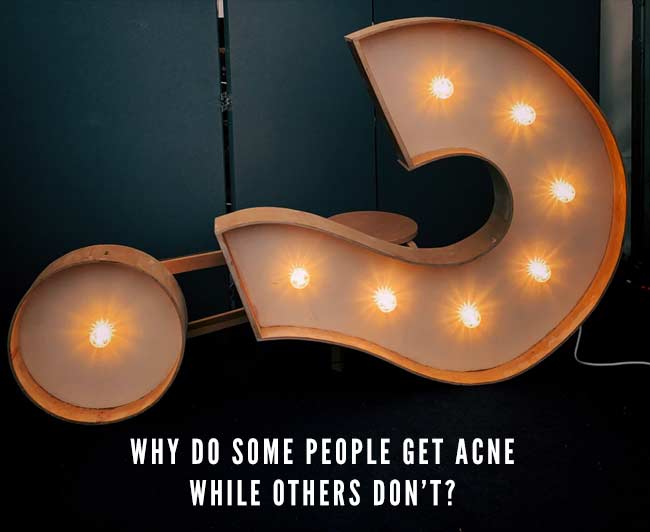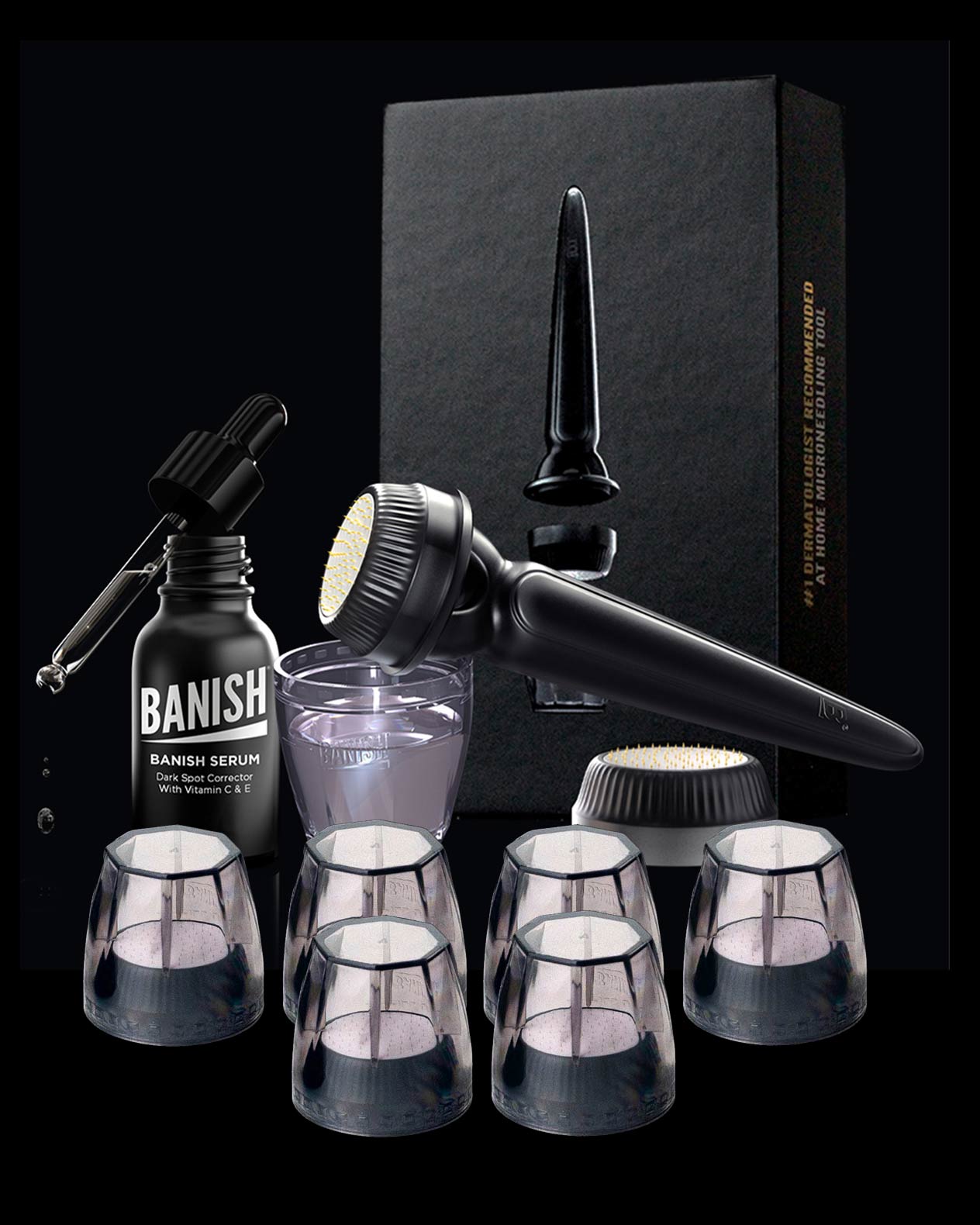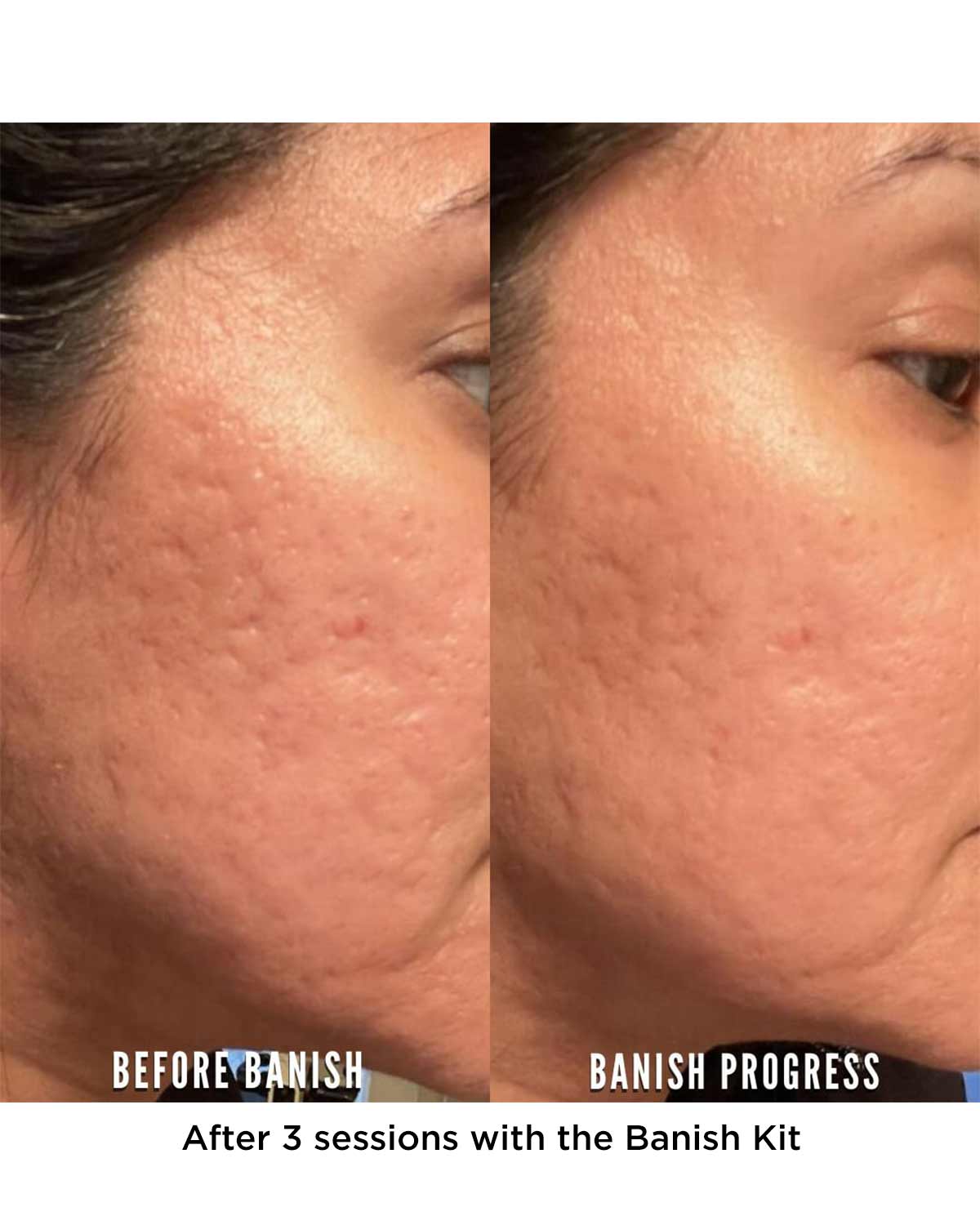Isn’t it a wonder why some or most of us get acne while others don't have any acne? When we think about having acne-prone skin, we start comparing ourselves with others, envy them for having such clear skin and ask ourselves “How come he/she gets that clear skin while I don’t? It’s just unfair.”
Having acne could knock confidence and self-esteem at a time when the person was going through the physical and emotional changes associated with adolescence.
Diet? Hormones? Stress? Skin health? Drugs? Genetics? Any or all of these could be a contributing factor to the cause of acne and research shows that certain strains of bacteria may be the culprits.
Acne is a common issue for many people, especially for teenagers and young adults in their 20s. Some have mild symptoms, while others can have very severe issues.
HOW COME I HAVE ACNE-PRONE SKIN WHILE OTHERS DON’T?
There’s no definite answer to why or how come we are more acne-prone than others. While the cause of acne may be unknown, hormones (specifically androgens) could play a role in acne growth.
These androgens increase during the stage of puberty or due to hormonal changes related to pregnancy or starting/stopping birth control pills and are responsible for making the skin’s oil glands to become larger and produce more sebum, leading to acne.
New research finds the microbes that cause the most common form of acne come in two flavors: the "bad" variety that causes pimples and the "good" type that may keep the skin glowing.
Genetics plays a role in this, Some people are born with healthy skin that doesn’t build up with sebum because they produce a diluted sebum which doesn’t cause them to bear acne while others suffer from pores filled with sebum because they produce a much thicker sebum. No matter the genetics, teenagers, somehow in their lifetime will experience acne.
There has been research from the UCLA, Washington university in St. Louis, and the Los Angeles Biomedical research institute, where they investigated two groups of participants as having acne or non acne published in the Journal of the investigation Dermatology on February 2013.
"We learned that not all acne bacteria trigger pimples — one strain may help keep skin healthy. We hope to apply our findings to develop new strategies that stop blemishes before they start, and enable dermatologists to customize treatment to each patient's unique cocktail of skin bacteria." – HuiYing Li, assistant professor of molecular and medical pharmacology at the David Geffen School of Medicine UCLA.
Scientist examined the build up of people with acne and those without, by studying their genetic markers. In this study they have identified many sort of strains of a type of bacteria known as “Propionibacterium acne” ( P acne for short) that might be the cause of acne.
Researcher Huiying Li and her partners identified three major categories on which the bacteria affect the skin health:
- The first bacteria was discovered both on acne and clear skin.
- The second bacteria, mostly found in people with acne- prone skin, which may lead to pimples.
- The third bacteria was mostly based on clear skin and scientist believe that they might have a solution against acne.
Most people without acne have bacterias that live in harmony on the skin until something happens that puts them off balance.
Gallo and his colleagues showed that a usually harmless bacterium that lives on our skin starts triggering inflammation and breakouts when it finds itself trapped in airless, oily conditions, such as hair follicles.
However, it still doesn't unlock exact reason of why some people have acne and others don't. “Not everyone’s hair follicles are created equal” – this statement could perhaps explain why not everyone suffers from acne. This might not only explain the root causes of acne - it could also reveal a whole new pathway through which bacteria trigger inflammation, and that could help scientists understand a range of different infections.
WHO GETS ACNE?
Some people go their whole lives with no more than a few blemishes in their early teens, while others suffer irritating acne for most of their adult life. It begs the question: are some people more prone to acne?
Acne is a very common skin condition affecting up to 85% of people in their late teens and early or mid 20’s. We may be thinking or asking ourselves “How come my friends get to eat so many bags of chips 24/7, drink Starbucks Frappuccino or even wear makeup and not get any acne pimples at all? It’s just not fair!” Perhaps it’s time we consider the bacteria living under our skin – the dreaded P. acnes bacteria.
Pretty much all of our skin is covered in bacteria all of the time - after all, it's the first line of defence against invading germs.
But despite this constant coating of bacteria, many people never experience breakouts, while others can't get rid of them no matter what they try.
WHAT CAN I DO TO PREVENT ACNE? (HABITS OF PEOPLE WHO NEVER GET ACNE)
Keeping clear skin is never easy.
Aside from genes, keeping a healthy lifestyle or habit is important in preventing acne. The reason some people never get acne anymore or still get clear skin is they keep some habits that would help them prevent acne and these are:
- Not skipping face wash
- Cleaning your phones
- Refraining from or never touching their face
- Changing pillow cases frequently
- Eating healthy for your body
- avoid popping and picking at skin
- Washing hair regularly
- Avoiding dairy or high-glycemic foods
- Not sharing makeup
- Never giving up the fight against acne
1. Not skipping face wash – The first step to keeping clear, acne free skin is to consider the skin cleanser products you use and how often you’re using it. The key here is to wash your face every single night. Skipping on this may lead to breakouts as dirt, oil and makeup could possibly block your pores.
“While having acne does not mean that you are dirty, washing your face has been shown in studies to improve the appearance of acne,” he says. Using a gentle skin cleanser that effectively removes dirt, oil, and makeup from the skin can help maintain a healthy skin barrier. ” – Joshua Zeichner, director of Cosmetic and Clinical Research and assistant professor of dermatology at Mount Sinai in New York City.
2. Cleaning smartphones – Your smartphones could also accumulate bacteria if they are not cleaned as often after use, particularly the screen. “Studies have shown that your cell phone is dirtier than a public toilet,” Dr. Zeichner says.
Keeping your phone close to your face for long periods of time could lead occlusion of pores followed by infection and acne, according to Ted Lain, a Texas-based dermatologist.
3. Refraining from or never touching the face – We’re all guilty of this one bad habit which is touching the face or keeping your face rested on your palms. Dr. Zeichner states that frequent face touching can cause acne breakouts.
“Leaning on your palm during the day can create friction against the skin, create inflammation and actually transfer dirt and oil that may get trapped in your pores,” he says.
4. Changing pillow cases frequently – “When you don’t refresh your pillowcase at least once per week, dirt and oil build-up, and when you put your face into the pillow at night, these blemish-causing substances can clog your pores” – Betty Rajan, dermatologist at Fort Worth, Texas
5.Eating healthy – Diet also plays a role in your acne. This healthy way of eating is rich in vegetables, olive oil, whole grains, plus small amounts of lean animal protein and of course, some red wine.
6. Never popping, picking or squeezing pimples – Another bad habit that we should break whenever we want a clear acne free skin is to never pop, pick at or squeeze the pimples because doing so will only aggravate the acne and possible cause acne scars.
7. Washing hair regularly – Washing your hair regularly helps remove the unwanted excess oil on your scalp and hair, minimizing the oil at the hairline and forehead. Dr. Joshua Zeichner also warns against using heavy, oily hair care products during styling.
8. Avoiding some types of milk and high-glycemic foods – “People who don’t drink cow’s milk may be less likely to get acne than those who do.” - Joel Schlessinger, dermatologist at Omaha, Nebraska
A 2016 study of 225 teens aged 14 to 19 that was published in the Journal of the American Academy of Dermatology found that people who drank more low-fat or skim milk had more acne that people who did not drink as much. (The study included teens with moderate acne or no acne.)
Avoiding foods that have a high glycemic index may also help in keeping an acne-free skin. Emerging data suggest that high glycemic index diets may be associated with acne, according to the latest guidelines from the American Academy of Dermatology. Exactly how a diet that is high on the GI index can cause or contribute to acne is not fully understood, but low GI foods keep blood sugar levels stable while high GI foods may cause a blood sugar spike that can lead to inflammation and oil production, which plays a role in acne.
9. Washing hands after working out – While exercising or working out on a daily basis is good to keep you fit and healthy, washing your hands after the long hours at the gym may already be common sense.
“Working out in a gym is potentially very dirty and can cause something that looks just like acne, but is actually a staph infection,” says Dr. Schlessinger.
10. Not sharing makeup – Sharing of makeup, brushes and applicators is also a major no-no when your goal is to keep an acne-free clear skin. No matter how jealous you are of your BFF’s new bronzer or a co-worker’s mascara, don’t borrow it. It may seem tempting to borrow one from your friend but never do so.
“Sharing makeup is sharing bacteria with a friend,” says Dr. Schlessinger.
11. Never giving up the fight against acne – We all get frustrated when results seem to take long after trying a certain skin care product we just bought to the point of giving up without even giving our skin the chance to recover on its own.
“It can be oh-so-tempting to skip the skin-clearing products in our skin-care regimen, but this is a mistake” – Mark H. Schwartz, clinical assistant professor of plastic surgery at Weill Cornell Medical College in New York City.
There are a lot of tips for acne prevention or keeping an acne-free , clear skin but let me end up with these in mind first.
Face it – there are some risk factors of acne we cannot or don’t have control of. No matter what we do, we can’t do anything about our genes. But there may also be risk factors of acne that we can improve or alter.
Acne itself isn’t caused by bad hygiene and having blackheads or spots don’t necessarily mean that your skin is dirty or you’re not washing properly. Acne, however, can be caused by certain skin care products that are comedogenic.
You can prevent spots from appearing in certain areas by avoiding pressure or friction against your skin. Acne often appears under collars, helmets, or backpacks, or in areas where we lean on our skin. Picking or squeezing spots can also make acne worse by irritating them and spreading infection. Changing the way you interact with your skin can therefore help to prevent spots from appearing or getting worse. Eventually, finding the root cause of acne is one of the surefire ways to prevent acne. However it's possible a new cause could arise, so never give up!
Conclusion
Not all skin types are ever the same – you are unique and so is your skin. Instead of always comparing yourselves with other people who have clear skin, learn to embrace them and remember that your skin type does not define who you are. With or without acne, you are beautiful and worth it.
Reference:
"New Study Could Explain Why Some People Get Zits And Others Don't" by Elaine Schmidt from UCLA; https://newsroom.ucla.edu/releases/new-study-could-explain-why-some-243582
























1 comment
Matt
Occasional pimples ain’t acne. Acne is severe, numerous and persistent pimples. 85% of teenagers experience pimples. 95% of teenagers DO NOT experience acne. Your patronising website is offensive.
Leave a comment
All comments are moderated before being published.
This site is protected by hCaptcha and the hCaptcha Privacy Policy and Terms of Service apply.